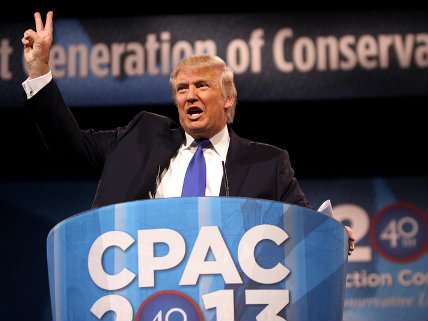The Republican Party Realizes It Has A Donald Trump Problem

Wait a minute—is Donald Trump actually going to win the Republican presidential nomination?
All throughout the summer, critics (including me) dismissed Trump as a novelty item—amusing for a moment, but thoroughly disposable and certain to be disposed of.
But now it's the end of October, and Trump is still leading the GOP polls. And that has the party establishment—the various and sundry party strategists and influencers and money-givers who've made it their business to shape the GOP's future—more than a little freaked out.
Over the past few days, party elites have begun, for the first time, to acknowledge that Trump could plausibly win the nomination. And as Byron York reports in The Washington Examiner, some of them are preparing to try to stop that from happening. One unnamed "leading conservative" tells York that the prospect of a Trump candidacy would inspire "massive resistance." Another source hints at the possibility of a massive barrage of attack ads in crucial early primary states.
As York notes, these would not be the first anti-Trump ads to run; the Club for Growth, which would likely be involved in any new effort, has already hit Trump once, sparking amusingly over-the-top legal threats from Trump. But the next round could be significantly bigger, and might, as York writes, "lead to an extraordinary scenario in which GOP stalwarts go to war to destroy their own party's likely nominee."
Republicans, or at least those in its professional class, have come to the conclusion that they have a Donald Trump problem. This is not wrong. But the problem is deeper than many seem willing to acknowledge.
Party elites have cast their fight as an ideological battle to save the GOP from Trump. As the source who predicted massive resistance tells York, Trump "is not a conservative."
I basically agree with that assessment. It is hard to describe someone who has supported socialized medicine, eminent domain, and tax hikes as in any way conservative. He is not exactly a liberal, either. Instead, there is no ideological rigor or policy coherence to be found in his campaign. He is best described as an opportunist.
But what does it signal that so much much of the Republican party's voter base has so enthusiastically supported a non-conservative for this long, and that Trump has now become a serious contender for its nomination? From this one might reasonably conclude that being a conservative may not be an essential requirement for the Republican party's presidential candidate.
And what that, in turn, suggests is that the GOP of 2015 is not a party that is particularly driven by ideological or policy commitments, but instead is motivated in large part by vacuous, reactionary Trumpism. GOP elites may be trying to rescue the Republican party from Donald Trump, but what if there's nothing left to save?
Elites themselves bear some responsibility here. What happened to the GOP happened long before Trump's campaign, in part because its elected leaders in Congress and elsewhere allowed and even encouraged it, harnessing the base's untempered enthusiasms to their own purposes over the years. It is more than a little bit ironic that the party's establishment is now attacking Trump for doing roughly the same thing.
Trump isn't the cause of the Republican party's troubles so much as their avatar and spokesperson. And the Republican party's Trump problem isn't Trump so much as it is the Republican party itself.


Show Comments (295)